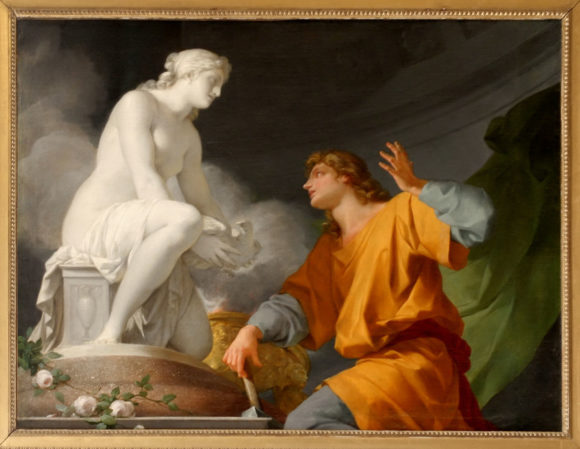 Doesn’t all AI end up being a reflection of who we are as humans? From the practical, I mentioned bias in how we build AIs and the prevalence of conversational bots. But we all know of the endless numbers of books and movies with stories of AI becoming something we cannot distinguish from humans.
Doesn’t all AI end up being a reflection of who we are as humans? From the practical, I mentioned bias in how we build AIs and the prevalence of conversational bots. But we all know of the endless numbers of books and movies with stories of AI becoming something we cannot distinguish from humans.
Is this simply the Pygmalion in all of us? We turn to external expressions to make sense of the human condition, through art, religion, science, sport, politics. Why not AI? And with so much expression imbued in an AI, might we not fall in love with it, or want it to be something we can fall in love with?
Cre-ai-tivity
I’m not going to go over all the examples of AI in art. But I would like to point you to a very interesting short movie written by an AI. Fed a corpus of sci-fi scripts, the AI, given a seed of an idea, wrote a short sci-fi script of its own. The video is the director’s and actor’s interpretation of the script.
The interesting thing is that it comes off as an off-beat movie, but with a touch of something deep that must be there. And if you think the dialogue is too off-beat, read something like the Naked Lunch, or Kafka.
And here’s a recent article on a performance of various pieces from various genres of music written by AI but performed by humans. This sparks a very interesting discussion on the balance between statistically creating music (the AI) and the human touch. The example used in the article is a pair of Mozart pieces – the one that’s all AI is all over the place, but the one with a bit of human intervention begins to have small stretches that feel like Mozart. But, of course, a fully Mozart-style piece does not emerge from the machine.
Though, one of the composers see that AI as a collaborator rather than a composer on its own, and that’s what is exciting to some musicians.
He points out that although the music sounds like Miles Davis, it feels like a fake when he plays it. “Some of the phrases don’t quite follow on or they trip up your fingers,” he says. This makes sense, as this isn’t music written by a human with hands sitting at a keyboard; it’s the creation of a computer. Artificial intelligence can place notes on a stave, but it can’t yet imagine their performance. That’s up to humans.
Source: A night at the AI jazz club – The Verge
My Fair AI
I think we approach the Ultimate Pygmalion in our desire to create simulacra of emotive, interactive beings. For example, there is no end to the wee AI-imbued gizmos we try to create to interact with us. Will these gizmos be as smart as a puppy, or try to do more and end up annoying? Anki’s Cozmo is the latest I’ve seen and a lot was put into the emotional intelligence of the toy.
And then there’s this very interesting story about a AI bot maker who lost a dear friend and used the texts her friend left behind to create a conversational memorial to him. The author of the article is sensitive to the emotional impact of this AI memorial, but also branches off into the areas of authenticity, grieving, personality, and the role of language.
Art is meant to get us to think about who we are as humans. The bot creator only wanted to build a digital monument to have that one last conversation with a dear friend. Yet, she touched a nerve that we could not have touched without her skill in AI and capturing a voice. Rather than create something that helps us do something or cope with something, her digital monument brings up many thoughts on humanity, culture, art, emotion. Should we build bots grounded in real personalities, as derived from their digital textual contrails? What happens to one’s voice when one has died? If our voice can persist, what does it mean to who we are, our mortality, to the ones we leave behind?
What do you think?
Image Pygmalion by Jean-Baptiste Regnault, 1786, Musée National du Château et des Trianons, from WikiCommons